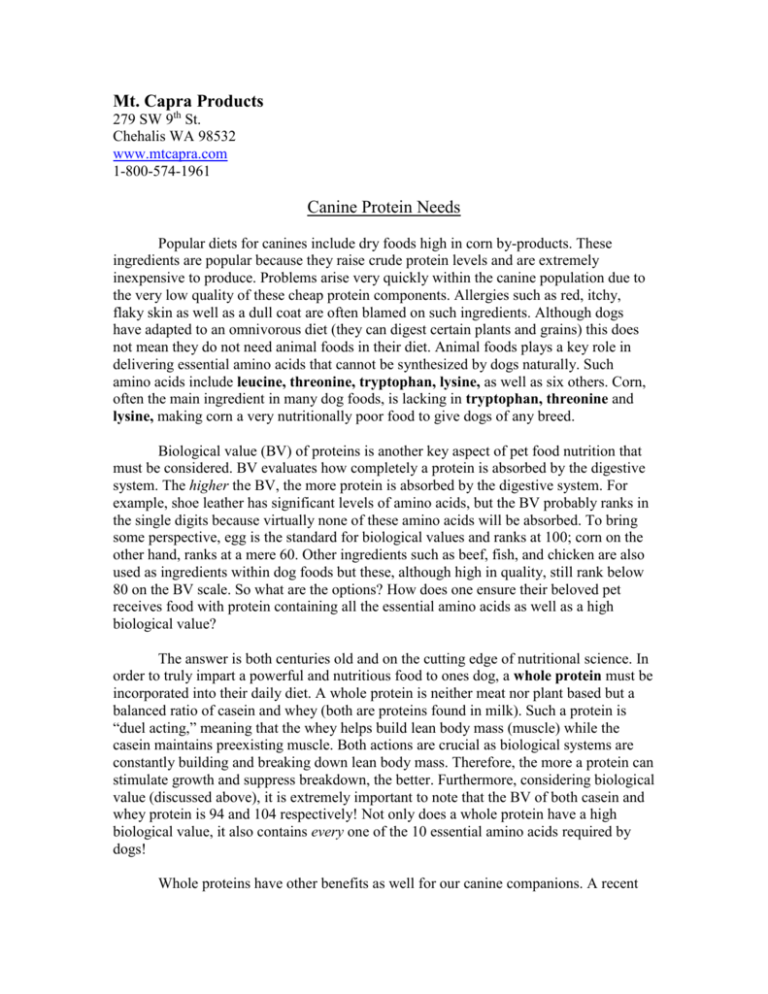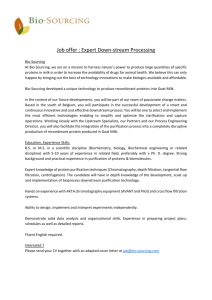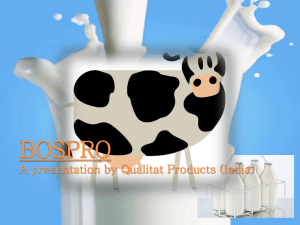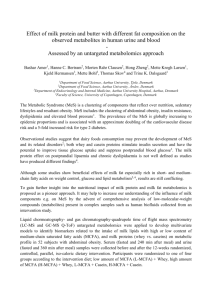Mt - PetfoodIndustry
advertisement

Mt. Capra Products 279 SW 9th St. Chehalis WA 98532 www.mtcapra.com 1-800-574-1961 Canine Protein Needs Popular diets for canines include dry foods high in corn by-products. These ingredients are popular because they raise crude protein levels and are extremely inexpensive to produce. Problems arise very quickly within the canine population due to the very low quality of these cheap protein components. Allergies such as red, itchy, flaky skin as well as a dull coat are often blamed on such ingredients. Although dogs have adapted to an omnivorous diet (they can digest certain plants and grains) this does not mean they do not need animal foods in their diet. Animal foods plays a key role in delivering essential amino acids that cannot be synthesized by dogs naturally. Such amino acids include leucine, threonine, tryptophan, lysine, as well as six others. Corn, often the main ingredient in many dog foods, is lacking in tryptophan, threonine and lysine, making corn a very nutritionally poor food to give dogs of any breed. Biological value (BV) of proteins is another key aspect of pet food nutrition that must be considered. BV evaluates how completely a protein is absorbed by the digestive system. The higher the BV, the more protein is absorbed by the digestive system. For example, shoe leather has significant levels of amino acids, but the BV probably ranks in the single digits because virtually none of these amino acids will be absorbed. To bring some perspective, egg is the standard for biological values and ranks at 100; corn on the other hand, ranks at a mere 60. Other ingredients such as beef, fish, and chicken are also used as ingredients within dog foods but these, although high in quality, still rank below 80 on the BV scale. So what are the options? How does one ensure their beloved pet receives food with protein containing all the essential amino acids as well as a high biological value? The answer is both centuries old and on the cutting edge of nutritional science. In order to truly impart a powerful and nutritious food to ones dog, a whole protein must be incorporated into their daily diet. A whole protein is neither meat nor plant based but a balanced ratio of casein and whey (both are proteins found in milk). Such a protein is “duel acting,” meaning that the whey helps build lean body mass (muscle) while the casein maintains preexisting muscle. Both actions are crucial as biological systems are constantly building and breaking down lean body mass. Therefore, the more a protein can stimulate growth and suppress breakdown, the better. Furthermore, considering biological value (discussed above), it is extremely important to note that the BV of both casein and whey protein is 94 and 104 respectively! Not only does a whole protein have a high biological value, it also contains every one of the 10 essential amino acids required by dogs! Whole proteins have other benefits as well for our canine companions. A recent study1 in The Journal of Nutrition looked at how different foods affect the Glomerular Filtration Rate (GFR) in dogs. The GFR refers to how much stress is put on the kidneys in order to digest proteins. Both soy and meat increased the GFR significantly indicating that these types of proteins induce more stress on the renal (kidneys) system. This same study tested casein's effect on the GFR and the results showed that casein did not increase GFR significantly. This study also gives further evidence that a whole protein could offer dogs with reduced renal function and normal renal function, a healthy alternative to soy, corn, and other vegetable proteins so widely used today. It is certain that a whole protein is superior to vegetable by-products. However, one must consider carefully, the biological source of the whole protein that is used in pet food. Although many manufacturers gravitate towards using the by-product of cheese production from cow’s milk (whey only, no casein), this is certainly not the healthiest choice. Instead, goat’s milk has been used for centuries as a healing and nutritious food for both pets and people. The biological make up of goat’s milk naturally causes it to be a superior food especially to that of cow’s milk. Goat’s milk protein is far easier to digest than cow’s milk protein due to differences in structure, amino acid composition, and casein-to-whey ratios. These distinctions really do matter as dogs that are placed on goat’s milk typically thrive and are a testament to the raw power of this nutritious food. In fact, countless veterinarians recommend goat’s milk in situations where a young animal, be it a dog, cat, lamb, or foal, cannot receive mothers milk. The whole protein found in goat’s milk contains all 10 amino acids essential for canine health, has a high biological value, and appears to be gentler on the kidneys than other proteins. Because goat’s milk protein is so overwhelmingly nutritious for both pets and people; it is the natural choice to use in dog food. Although utilizing goat’s milk protein in dog foods may sound like a new idea, many manufacturers seeking to develop nutritious and wholesome foods have successfully created such products. Mt. Capra Wholefood Nutritionals is currently the largest and most respected goat’s milk protein manufacturer in the country. Utilizing a patented light wave technology called “Refractance Window Drying,” Mt. Capra is able to quickly dry their goat’s milk protein at low and gentle temperatures, avoiding the harsh processing condition utilized by many other protein manufacturers. Mt. Capra’s farm, free-range goats, and manufacturing facility are located in Washington State. To inquire further about utilizing goat’s milk and goat’s milk protein in pet foods, please contact Arny Davis at 1-800-574-1961 or at info@mtcapra.com. 1. Delmar R. Finco, Tanya L. “Soy Protein Increases Glomerular Filtration Rate in Dogs with Normal or Reduced Renal Function” The Journal of Nutrition







